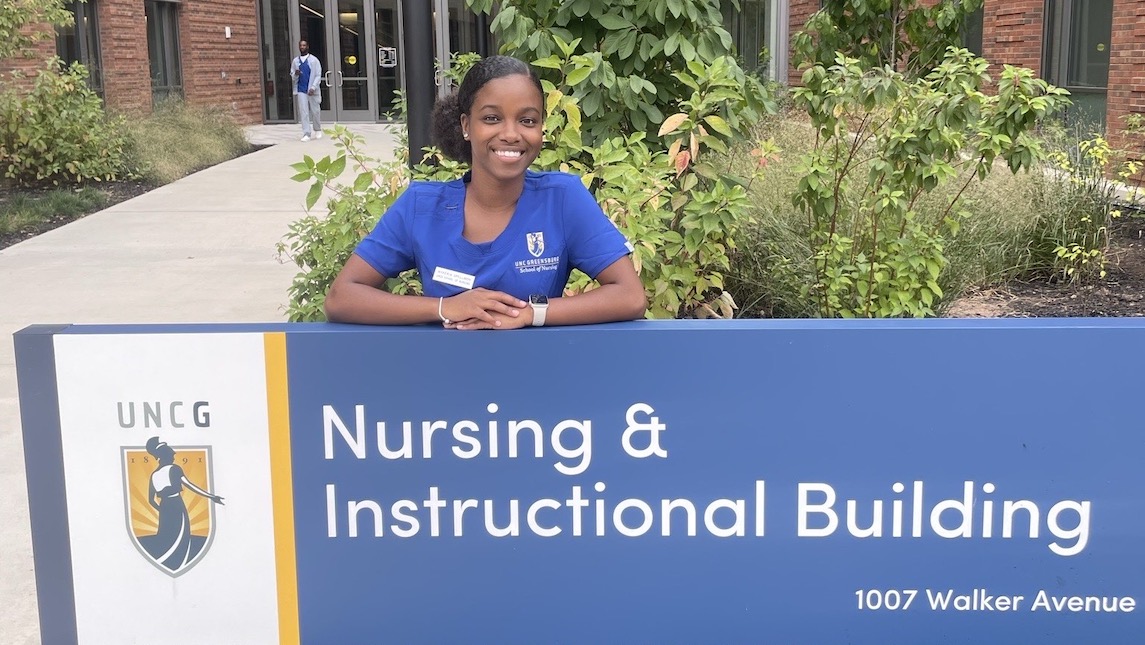Artificial intelligence tools, namely large language models (LLM) like ChatGPT and image generators like Dall-E, exploded into public view this year. For some, they are an exciting new tool to learn and create. Others fear the risks are greater than the rewards, and AI could have ramifications on hard work, accuracy, and quality.
“It’s important that we teach students how to use AI ethically and responsibly while they’re here with us, because they will most definitely be engaging with it in practice.”
Dr. Lindsay Draper, clinical associate professor of nursing
UNC Greensboro faculty are at the forefront of innovation, in the programming of AI and its impacts on business, cybersecurity, and other fields. Many have already spent time practicing with AI tools to understand their benefits and drawbacks. This year, the University Teaching and Learning Commons (UTLC) announced generative AI implementation grants for faculty to incorporate AI tools into their Spring 2024 courses.
Professors and lecturers from theatre, nursing, media studies, and Spanish shared how they will empower their students to lead a changing technological landscape.
Theatre
Tara Webb, lecturer of costume technology; and Jehann Gilman, lecturer of wigs, hair, and makeup, are excited to unpack the possibilities for AI in an artistic field. It is also one field where people are most worried about the impact of AI on jobs. Webb and Gilman have a keen eye for determining the parameters of what AI can and cannot do in the professional world of theatre.
“We’re really interested in having those conversations with students,” says Webb. “Just like anything else, this is a tool. I’m sure people have had this conversation about tools throughout history. We’re at that part of the conversation now.”
They used ChatGPT to design an AI module for Canvas for some of their courses, but they will allow students in other classes to explore how AI can help them design theatrical wardrobes, hairstyles, and makeup. They want to build standards for AI to handle time-consuming preparation and training tasks, so that artists can get to the hands-on process that they love.

Courses Using AI
- THR 101 Foundations in Theatre
- THR 145 Stagecrafts: Costumes 2
- THR 147 Stagecrafts: Makeup & Wardrobe 2
- THR 244 Technical Production: Costumes 2
- THR 262 Technical Production: Wigs, Hair and Makeup 2
Gilman says, “The ability of a human to think on their feet, to be able to work with another person, and to have that creative spark inspired by the way they think and the experiences they’ve had, can’t be replaced by a program.”
Gilman says AI could bolster students’ technical skills, a challenge that has emerged in recent years as children become less exposed to the arts in their formative years. More students, she says, have become nervous about their ability to visualize an idea and draw it.
“AI makes the subject itself more accessible, because it gives them a place to start, while not being the finishing point,” she explains.
Nursing
AI is already part of healthcare, according to Dr. Tiffany Gibson, clinical associate professor in the School of Nursing. “I’m sitting here with an AI here at my desk,” she says. “If my patient signs a release, then I can use it to intuitively take notes of what we discuss.”
Gibson is one of several faculty championing AI in the School of Nursing, among them Dr. Lindsay Draper, clinical associate professor and Nursing’s director of faculty credentialing, compliance, and special initiatives. “AI is here to help us to be more efficient and effective so that we can provide the very best care for our communities,” says Draper.
They designed a module for teaching AI’s benefits, challenges, and ethical implications. Students will do presentations tying AI to real-world scenarios. “I’m redesigning every single assignment in nursing informatics to use AI,” says Draper.
Courses Using AI
- NUR 355A and B: Pathophysiology and Pharmacology
- NUR 450-Evidence-Based Practice and Nursing Research
- NUR 714 Foundations of Informatics and Computational Systems

Nurses must sift through lots of information. Gibson’s pathopharmacology courses are particularly challenging in that regard. She will teach students how to use prompt engineering – steering AI with intentional choice of words, phrases, or formats to gain substantive responses – to create effective study guides and parse through the data. “It’s not going to do the work for them,” says Gibson. “They still have to get this information, apply it, and use it in the nursing world.”
Draper says students can also help train AI used by the public. People will no doubt use LLMs to research symptoms and treatment, but the information AI presents may be inaccurate or biased. “It’s going to become the next Dr. Google,” says Draper. “This is a great learning opportunity for students to ask Dr. ChatGPT questions as if they are patients. Then they can evaluate: Was it accurate? Was it not accurate? What was inaccurate? Was what it generated superficial, or did it give information that you would really need if you were a patient?”
Draper, Gibson, and other AI-pioneering faculty within the School of Nursing also organized a conference-style faculty retreat on AI for the School of Nursing to kick off the semester.
Media Studies
Media has been blending digital and physical tools for a while. Disney’s “The Mandalorian” is one recent example, says Kevin Wells, senior lecturer of media studies. “They have an LED wall behind the talent. They have physical actors and a physical set in the foreground, and a digital background that’s generated by something like Unreal Engine that corresponds to the camera moving in real time.”
He has used similar innovative tools within the department. This year, he will incorporate AI tools that generate a background image plate in the production crews’ monitors while they shoot in front of a greenscreen. Later this semester, they will install a new LED wall, enabling the use of AI tools like Cuebric to generate dynamic digital backgrounds with proper depth layers that the crew and talent can see in real-time.
Wells can also give students access to tools for practice outside of class. “I couldn’t ask students to subscribe to ChatGPT Plus for $20 a month,” he says. “So, I was excited about the recent announcement that I can make a Custom GPT available to them if they have a free account. This lets me create a chat bot for the course that can offer technical support when they are working outside of class.”

Courses Using AI
- MST 271 Introduction to Media Production
- MST 483 Advanced Media Production: Virtual Production
Having explored with AI on his own time, Wells is interested in seeing the ways that students test its capabilities and limits. He’s heard enthusiasm as well as concern.
“A lot of my conversations with students have been, ‘Is this going to affect my ability to be employed?’” he says. “I think we’re a long way off from creating characters, not just backgrounds or props. But AI is already adept at handling many entry-level tasks. So, understanding that is what is happening can help students look for ways to skill up, to future proof their ability to find employment.”
Many of his students are excited about the potential. They’ve made images with Midjourney and discussed making videos with Sora. “Some of the fun is learning the language you need to speak to get the output that you want,” says Wells.
Spanish
As an expert in language and its effect on culture, Dr. Ignacio Lopez, professor of Spanish, believes departments like Languages, Literature, and Culture here at UNCG must play a pivotal role in the development of LLMs.
He says students need experience with AI to be ready for a career. “It would be like graduating as an accountant without knowing how to use Microsoft Excel, or a graphic designer who has never used Adobe Creative Cloud apps,” says Lopez.
His plans for AI will help his students build a holistic understanding of history and culture.
Courses Using AI
- SPA 317 Foundations of Hispanic Cultures
- SPA 351 Introduction to Hispanic Literature

Lopez has long used a “contact hour” assignment to immerse the students in the language through a film, book, or conversation with a native speaker. In his Foundations of Hispanic Cultures, he’s adding a “virtual contact hour.” The AI, he says, can be trained to play the part of an individual – complete with a backstory assigned to it by the student – and hold a conversation in a Hispanic language.
“What I like about this mediated experience is its individuality,” says Lopez. “Each student will direct the conversation based on their personal interests and upon returning to the classroom, they can report and reflect on their experiences and engage in critical thinking exercises.”
Lopez says universities should train their faculty in how to use AI so that they pass along best practices to their students. “I use ChatGPT to review my lesson plans, identify potential biases, and suggest activities and explanations to accommodate all learning styles of my students, as reported by OARS or observed in class,” says Lopez. “Of course, it does not mean you must do everything the AI suggests, but knowing it is helpful.”
Story by Janet Imrick, University Communications
Photography by Sean Norona, Lynn Hey, and Dana Broadus, University Communications
Additional photography courtesy of Adobe Stock




